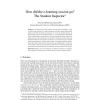Free Online Productivity Tools
i2Speak
i2Symbol
i2OCR
iTex2Img
iWeb2Print
iWeb2Shot
i2Type
iPdf2Split
iPdf2Merge
i2Bopomofo
i2Arabic
i2Style
i2Image
i2PDF
iLatex2Rtf
Sci2ools
AIED
2007
Springer
2007
Springer
How did the e-learning session go? The Student Inspector
Good teachers know their students, and exploit this knowledge to adapt or optimise their instruction. Traditional teachers know their students because they interact with them face-to-face in classroom or one-to-one tutoring sessions. In these settings, they can build student models, i.e., by exploiting the multi-faceted nature of human-human communication. In distance-learning contexts, teacher and student have to cope with the lack of such direct interaction, and this must have detrimental effects for both teacher and student. In a past study we have analysed teacher requirements for tracking student actions in computer-mediated settings. Given the results of this study, we have devised and implemented a tool that allows teachers to keep track of their learners’ interaction in e-learning systems. We present the tool’s functionality and user interfaces, and an evaluation of its usability. Keywords. Methods, tools and techniques for effective evaluation of cognitive, meta-cognitive ...
AIED 2007 | Artificial Intelligence | Distance-learning Contexts | One-to-one Tutoring Sessions | Student |
| Added | 07 Jun 2010 |
| Updated | 07 Jun 2010 |
| Type | Conference |
| Year | 2007 |
| Where | AIED |
| Authors | Oliver Scheuer, Claus Zinn |
Comments (0)

